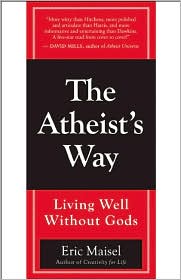When I selected The Atheist’s Way: Living Well Without Gods, I expected a fair, respectable approach from a path alternative to mine. I have wanted to learn more about the atheist path because I have been encountering more and more atheists within my extended circle. At work (a Unitarian Universalist church), I encounter many families, within which members do not share all values or religious beliefs. While many of my most intimate friends are Pagan like me, they may be married to an atheist or work in secular environments. I have wanted to learn more about atheism because I want to know what common ground there is between atheists and believers and how I can give advice applicable to my friends of faith and their atheist partners.
I found much less sympathy for the path of faith within the book than I expected. While I was a Pagan approaching the path of atheism to be educated (without judgment or feelings of superiority), I found judgment and superiority in the writings of Eric Maisel.
Maisel made statements such as, “We can do so much better” [than people of faith] (p. 4) and that religious people have made the “wrong investment” (p. 6). Maisel assumes atheism is the preferred path, “...if only you could get free of those inculcated thoughts, you would be an atheist. You may discover that you are much closer than you think to shedding your disempowering and dangerous beliefs in gods and freeing yourself to live more happily and more powerfully” (p. 41). Maisel does not see atheism as one equal option among many. Maisel believes atheism is superior to any set of spiritual beliefs. Maisel even instructs his readers in guiding others to the path of atheism (or “rationality”). Maisel recommends changing “spiritual” to “meaningful” when paraphrasing another, “In this way you keep yourself supernatural-free and help others move in the direction of rationality” (p. 136).
Maisel and I agreed on a few things. Maisel writes, “We’re in a constant battle to protect ourselves against the dumbing down of public education with the religious push against science. Anti-Western, antifreedom, and antifemale religious sects are gaining strength throughout the world” (p. 162). Although I agree to preserve the intellectualism of public education, I think Maisel has misdiagnosed the nature of education systems: “The very design of our schools--of all schools, since schools are always conservative in intent--supports this antiexistential agenda” (p. 46). In actuality, schools are more naturally liberal places of education. Maisel thinks students do not learn to think for themselves in school. He does not mention English, creative writing, or intelligent History teachers who teach about bias. Anti-science religious sentiment is not native to education systems.
Overall, I’d like to see more explanation of atheism and less judgment of spirituality.
Review by Michelle Mueller
Author: Eric Maisel
New World Library, 2009
pp. 187, $14.00

